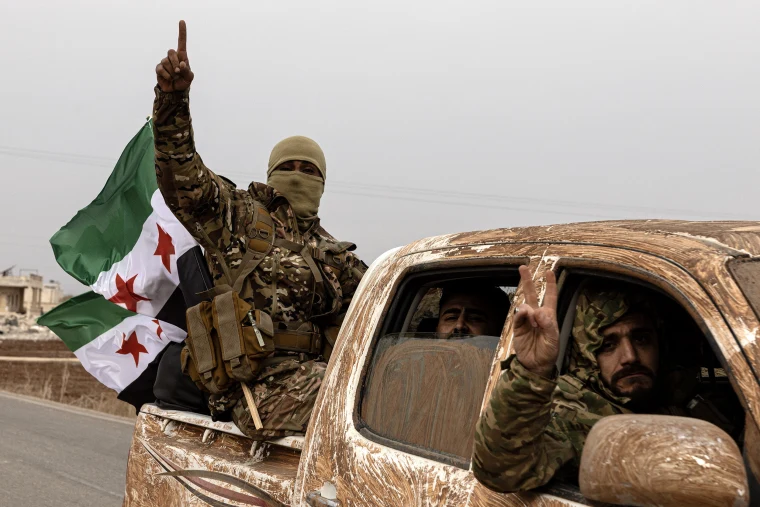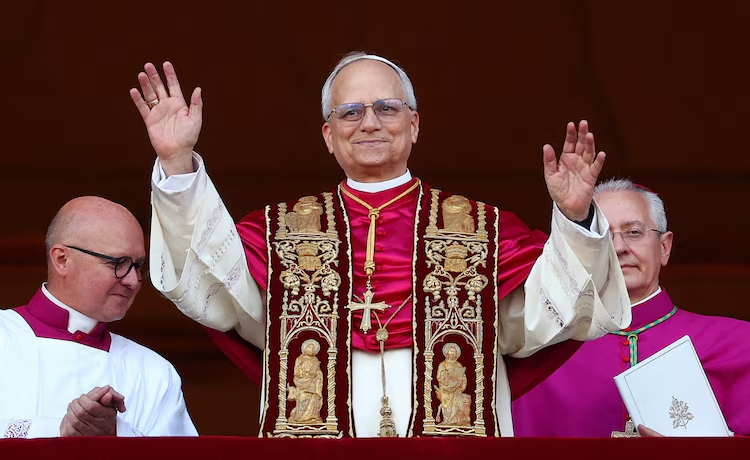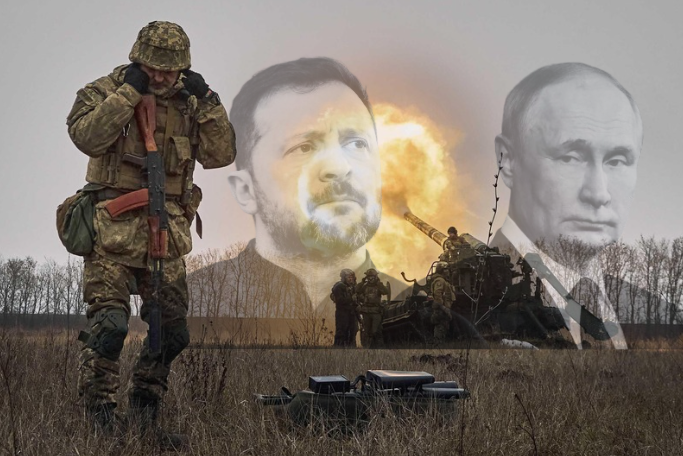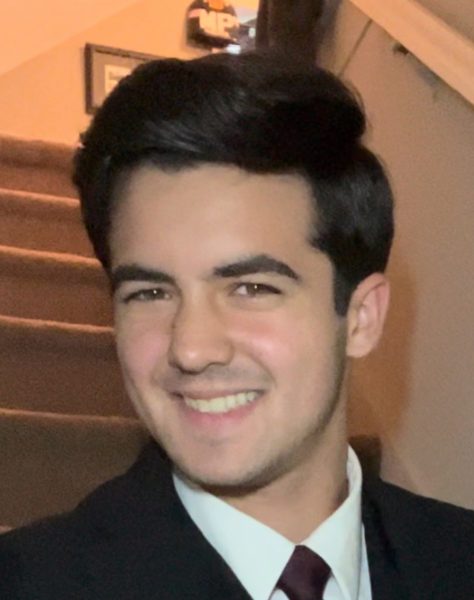This December, history was made as Bashar al-Assad’s 24-year reign finally came to an end. On December 8, 2024, President Bashar al-Assad fled the Syrian capital, Damascus, following a swift and successful counteroffensive that seemingly came out of nowhere by the Syrian rebels. A tyrant is no more, so will Syria finally become the prosperous nation it desires to be? Unfortunately, it doesn’t seem very likely.
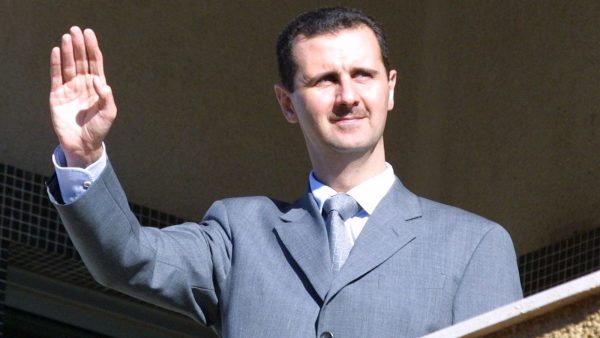
The Syrian Civil War is a conflict that has been on the minds of politicians worldwide. As the dictatorial President of Syria, Bashar al-Assad, whose familial ‘dynasty’ has ruled for over half a century, was the cause of many humanitarian crises throughout the 2010s. Since March 15, 2011, the start of the bloody Syrian Civil War, according to the United Nations High Commissioner for Refugees, well over 7.2 million Syrians have been displaced by this dire and complicated conflict.
Some context: in the tumultuous 1960s, following a coup of the traditional leaders of the Ba’ath Party in Syria in 1966, the father of Bashar al-Assad, Hafez al-Assad, was appointed to the position of defense minister of the new government. Four years later, he used this position to conduct a third coup, which put Hafez as the head of the government in September of 1971.

Hafez al-Assad ruled as the President of Syria from 1971 until his death in June of 2000, when his son, Bashar al-Assad, essentially inherited the office as a new hope for Syria following the brutal dictatorship of his father. However, all hopes were crushed when Bashar al-Assad turned out to be as bad, if not worse than his father.
On March 15, 2011, following the brutal quelling of protests that started from widespread discontent with Bashar’s rule alongside pro-democracy sentiments, Syria broke into multiple factions and devolved into a complicated and terrible Civil War. The main belligerents of the war can be grouped into two distinct factions, the pro-Bashar al-Assad and anti-Bashar al-Assad Groups.
The Pro-Bashar al-Assad groups include the government of the Syrian Arab Republic, coastal Shia allied citizens, and the Iranian-proxy terror group Hezbollah along with other international allies.
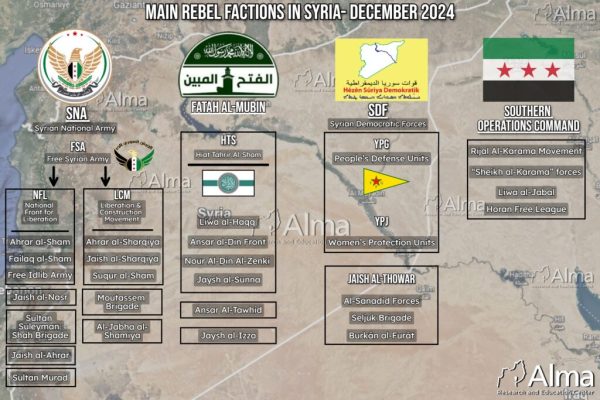
While the anti-Bashar al-Assad group includes five different primary factions, many of whom do not get along with each other. This group includes:
Hayat Tahrir al-Sham (HTS; Levant Liberation Union), led by Abu Mohammed al-Julani, the HTS is the dominant group in Syria, as they are the group that toppled the regime of Bashar al-Assad. Julani and the group as a whole have roots in Al Qaeda and ISIS, but, Julani promises to take a more moderate approach if they are the ones who come to power, concerns continue to persist due to the group’s origins and its many members.
Turkish-backed Syrian National Army (SNA), the SNA was created in the northwest region of the country bordering Turkey. Mixed between Arabs and Turkmen, the group has not only taken a massive anti-Assad but, due to its alliance with the government of Turkey in Ankara, has taken a stance against a fellow rebel group, the Kurdish Syrian Democratic Forces, as they (along with Turkey) want to prevent the Kurdish from “establishing a solid, contiguous presence on the Syrian side of its southern border and stabilize the zone to allow the return of refugees” (The Guardian).
The Kurdish Syrian Democratic Forces (SDF), is comprised primarily of a Middle Eastern ethnic group that has been fighting for a state for many years: the Kurdish. The Kurdish, located in the northeast of Syria, bordering the Kurdish region of Turkey, has been striving to achieve a level of autonomy, which Turkey strongly opposes as they fear a “domino effect” type scenario where that would inspire Iraqi and Turkish Kurds to push for autonomy and/or outright independence.
The Southern Operations Command, a newly established group in south and southeastern Syria, is comprised of a distinct group of people known as the Druze. Not much is known about this group compared to the aforementioned ones, however, this group has appeared to be significantly more moderate than most other groups, and has a shot of gaining power as they were the first rebel group to reach Damascus and captured many of the suburban areas of the Damascus area.
The Islamic State in Iraq and Syria (Isis), is a very well-known terrorist group that used to span all over Syria and Iraq. It has become notably weaker in recent years and has pretty much been eradicated, as the death of its leader under the Trump administration, Abu Bakr al-Baghdadi, in 2019 marked the beginning of the end of the group, as they’ve been almost totally defeated.
With the breakout of this Civil War leading to huge humanitarian crises and war crimes against civilians, the conflict quickly became international. The United States began getting involved under the Obama administration, but due to the complexities of the war and other circumstances, the United States became less interested throughout the later Obama administration and early Trump administration. Other Western countries also got involved in the war on the side of the rebels with the United States, such as Britain, France, and the Netherlands.
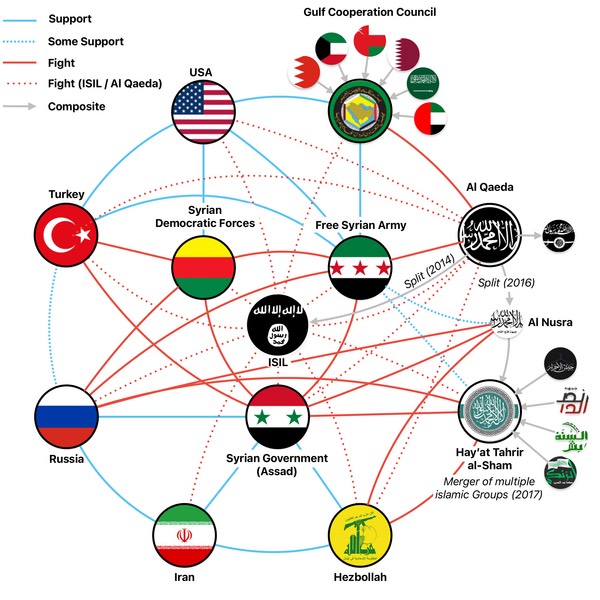
In the Middle East, there’s a massive divide that has plagued the politics of the region for centuries: the Sunni and Shia Islamic split in the religion. Saudi Arabia is a large Sunni Islamic Kingdom that got involved in the war on the side of the rebels due to their opposition to Russian and Iranian intervention, which is further exacerbated by the religious differences between the Shia Syrian government and the majority Sunni population of Syria. Qatar on the other hand, got involved in the war to support the Muslim Brotherhood in Syria, a Sunni rebel group who wished to overthrow Assad and establish an Islamic state with Sharia Law.
Israel is in support of the Syrian Rebels due to Syria’s alliance with Iran and it is of peak interest to ensure that no more terrorist groups (particularly Iranian-allied ones) pose a national threat to Israel and its citizens.
Turkey essentially entered the war on the side of the Syrian National Army (SNA). Long story short, Turkey had a massive southeastern region of their country with a massive Kurdish population who desired autonomy and/or outright independence. Turkey for the past few decades has been brutally oppressing all Kurdish movements in the region. The Northeastern region of Syria, bordering Turkey, also has a substantial Kurdish population who fight under the Syrian Democratic Forces (SDF). To ensure that there is no inspiration for Turkish Kurds to fight for independence, Turkey is attempting to eradicate all Kurdish power from the region to avoid such a circumstance. Hence, Turkey backs the SNA to prevent any power, autonomy, or even outright independence being granted to the Kurdish peoples of Syria.
On the contrary, Russia intervened in the conflict heavily on the side of Bashar al-Assad in order to maintain an alliance with Syria, keep its key military bases/ports on the Mediterranean Sea, and for many other unknown reasons.
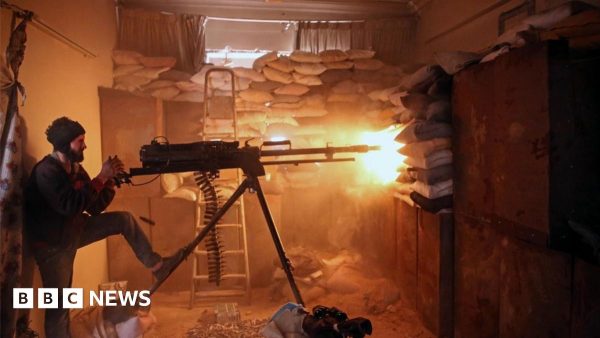
Furthermore, and most significantly: Iran. Iran is the largest Shia country in the Middle East, ruled by a tyrannical theocratic oligarch, it has competed with Saudi Arabia for dominance in the Middle East, but in far more aggressive ways, and is incredibly anti-Israel and has pushed for the attack of the country. For instance, Iran funds and supports a plethora of different proxy terrorist organizations all over the region, such as Hamas, the Houthis, and Hezbollah. With Bashar al-Assad in power, Iran had a crescent of Shia-Muslim-allied territories: they had Iraq to their west (which they at the time had a lot of power over), Syria to the west of Iraq, and the Shia proxy terrorist organization of Hezbollah located in southern Lebanon to the southwest of Syria.
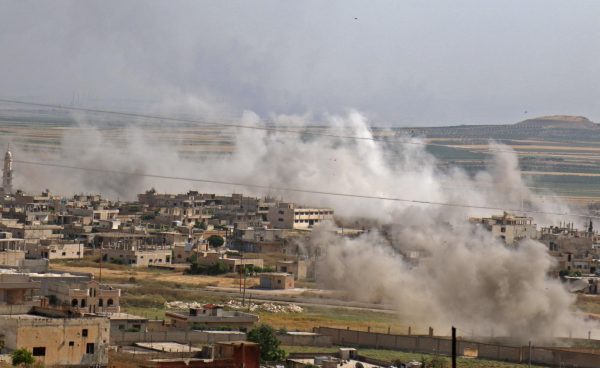
With all that said, it is now easy to understand why this conflict is so bloody and complicated. Throughout the decade of war, each faction has fought one another with brutal force. Moreover, the Assad regime has used despicable means of warfare, such as the use of incredibly destructive explosive devices on civilian targets and the use of chemical warfare on civilians and soldiers alike.
For most of the 2010s and early 2020s, it seemed as though the conflict would at most be a stalemate, as the Assad regime continued to maintain power and quell rebel attempts of movement. This was not to last though, as in late November 2024, the aforementioned rebel groups began making massive gains while going on a counter-offensive attack on key cities.
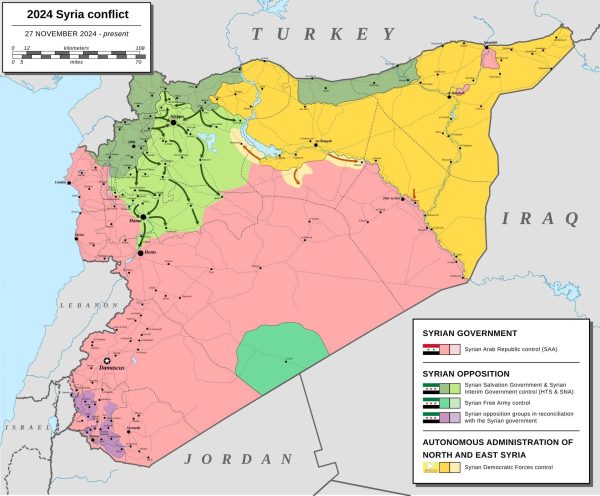
On November 29, rebels began entering the second largest city of Syria, Aleppo and successfully captured it outright the following day. Shortly after, in an inconceivably quick series of events, rebel forces captured the city of Hama on December 5, the cities of Daraa and Homs both separately on December 7, and finally, on December 8th, rebel forces entered the capital city of Damascus, with Bashar al-Assad fleeing the country to seek asylum in Russia not too long before.
With Assad and his family gone to Russia, it marks the historic end of a 53-year rule of Syria. With the government gone and Syria in a temporary power vacuum, the rebel groups are currently sorting out what will happen with the future of Syria, which is, for the time being, unknown.
While it is wonderful that the tyrannical regime of the Assad family is no more, there are concerns about what is to happen next to Syria. Many of the rebel groups have connections to well-known terrorist organizations or are considered themselves to be a terrorist group. The rebel group that captured Damascus, and is likely to be the next ruling government of Syria, Hayat Tahrir al-Sham (HTS) is led by Abu Mohammad al-Julani, a former member of Al Qaeda and has ties to Isis. Despite his shady history, al-Julani has stated that he wishes to take a more moderate approach to rule over Syria and has distanced himself from extremist groups. There is a massive concern spreading worldwide about what is to happen with Syria, and we still have no clue about what is to come with the country; as violence continues to ensue in the cities of Syria, the groups all have different interests.
As a precautionary measure, Israel recently seized control of the Golan Heights, a disputed territory in the southwestern region of Syria and the northeastern region of Israel. If an anti-Israeli faction were to take control, the Golan Heights would provide an extremely advantageous point to barrage Israeli cities with missiles; hence, Netanyahu recently stated why Israel is temporarily occupying the area. Furthermore, for the United States, President Biden, despite being in his last month of office, announced that the United States will be sending money to the new government that is established in Syria. Despite President Biden’s decision, Tulsi Gabbard, the incumbent Director of National Intelligence for the Trump Administration, has stated that the United States will not get involved with Syria once Trump assumes office on January 20, 2025.
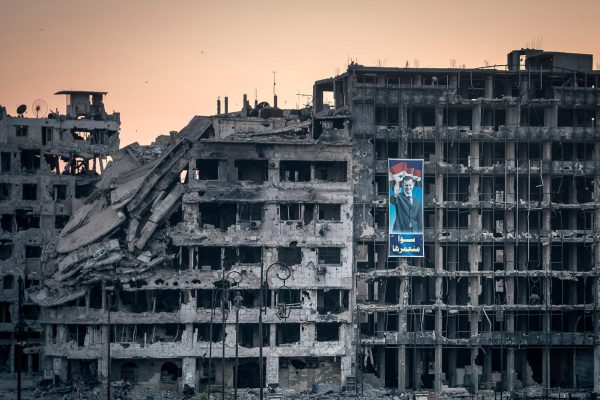
In conclusion, with Bashar al-Assad out of Syria, a rebel victory in Syria, and another war ending in the Middle East. The Syrian Civil War is a conflict that has been at the forefront of the minds of politicians all over the world, as this regional conflict provoked an unconventional amount of international intervention. For now, we can only hope that peace and prosperity will soon be brought to the Middle East, but the many issues that continue to plague the Syrian country with its many different rebel factions pose a major concern for the future prosperity and well-being of this state.
Photo courtesy of NBC, BBC, Wikipedia, Reddit, Azerbaycan24, Alma, New York Times, and ABC.

